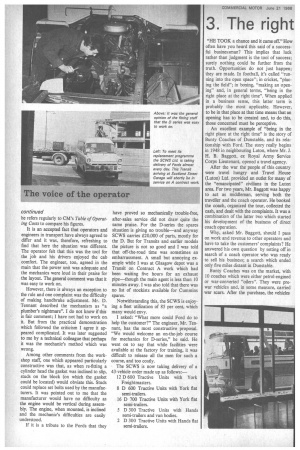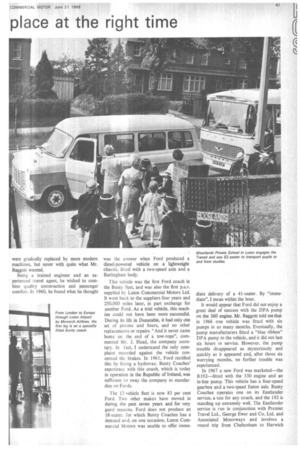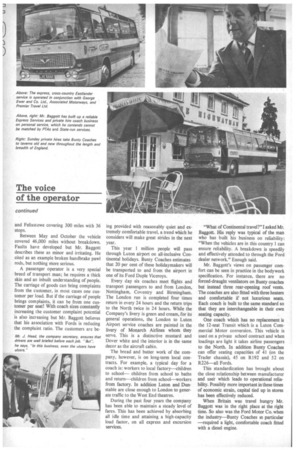3. The right place at the right time
Page 42

Page 43

Page 44

If you've noticed an error in this article please click here to report it so we can fix it.
"HE TOOK a chance and it came off." How often have you heard this said of a success ful businessman? This implies that luck rather than judgment is the tool of success; surely nothing could be further from the truth. Opportunities do not just happen;
they are made. In football, it's called -running into the open space"; in cricket, "plac
ing the field"; in boxing, "making an open
ingand, in general terms, "being in the right place at the right time". When applied
in a business sense, this latter term is probably the most applicable. However, to be in that place at that time means that an opening has to be created and, to do this, those concerned must be perceptive.
An excellent example of "being in the right place at the right time" is the story of Bunty Coaches of Dunstable, and its relationship with Ford. The story really begins in 1948 in neighbouring Luton, where Mr. J. H. B. Baggott, ex Royal Army Service Corps Lieutenant, opened a travel agency.
After the war the people of this country were travel hungry and Travel House (Luton) Ltd. provided an outlet for many of the "emancipated" civilians in the Luton area. For two years, Mr. Baggott was happy to act as middleman, serving both the traveller and the coach operator. He booked the coach, organized the tour, collected the cash, and dealt with the complaints. It was a combination of the latter two which started his development of the business of direct coach operation.
Why, asked Mr. Baggott, should I pass on work and revenue to other operators and have to take the customers' complaints? He answered his own question by setting off in search of a coach operator who was ready to sell his business; a search which ended only five miles distant in Dunstable.
Bunty Coaches was on the market, with 10 coaches which were either petrol-engined or war-converted "oilers". They were prewar vehicles and, in some measure, carried war scars. After the purchase, the vehicles were gradually replaced by more modern machines, but never with quite what Mr. Baggott wanted.
Being a trained engineer and an experienced travel agent, he wished to combine quality construction and passenger comfort. In 1960, he found what he thought was the answer when Ford produced a diesel-powered vehicle on a lightweight chassis, fitted with a two-speed axle and a Burlingham body.
This vehicle was the first Ford coach in the Bunty fleet, and was also the first p.s.v. supplied by Luton Commercial Motors Ltd. It went back to the suppliers four years and 250,000 miles later, in part exchange for another Ford. As a trial vehicle, this machine could not have been more successful. During its life in Dunstable, it had only one Set of pistons and liners, and no other replacements or repairs. "And it never came home on the end of a tow-rope", commented Mr. J. Head, the company secretary. In fact, I understand the only complaint recorded against the vehicle concerned the brakes. In 1961, Ford rectified this by fitting a hydrovac. Bunty Coaches' experience with this coach, which is today in operation in the Republic of Ireland, was sufficient to sway the company to standardize on Fords.
The 12-vehicle fleet is now 83 per cent Ford. Two other makes have moved in during the past seven years and for very good reasons. Ford does not produce an 18-seater, for which Bunty Coaches has a demand and, on one occasion, Luton Commercial Motors was unable to offer imme diate delivery of a 4I-seater. By "immediate", I mean within the hour.
It would appear that Ford did not enjoy a great deal of success with the DPA pump on the 360 engine. Mr. Baggott told me that in 1966 one vehicle was fitted with six pumps in as many months. Eventually, the pump manufacturers fitted a "blue ribbon" DPA pump to the vehicle, and it did not last six hours in service. However, the pump trouble disappeared as mysteriously and quickly as it appeared and, after those six worrying months, no further trouble was experienced.
In 1967 a new Ford was marketed—the R192—fitted with the 330 engine and an in-line pump. This vehicle has a four-speed gearbox and a two-speed Eaton axle. Bunty Coaches operates one on its Eastlander service, a test for any coach, and the 192 is standing up extremely well. The Eastlander service is run in conjunction with Premier Travel Ltd., George Ewer and Co. Ltd. and Associated Motorways and involves a round trip from Cheltenham to Harwich and Felixstowe covering 300 miles with 36 stops.
Between May and October the vehicle covered 46,000 miles without breakdown. Faults have developed but Mr. Baggott describes these as minor and irritating. He cited as an example broken handbrake pawl rods, but nothing more serious.
A passenger operator is a very special breed of transport man; he requires a thick skin and an inbuilt understanding of people. The carriage of goods can bring complaints from the customer, in most cases one customer per load. But if the carriage of people brings complaints, it can be from one customer per seat! With coach sizes constantly increasing the customer complaint potential is also increasing but Mr. Baggott believes that his association with Fords is reducing the complaint ratio. The customers are be ing provided with reasonably quiet and extremely comfortable travel, a trend which he considers will make great strides in the next year.
This year 1 million people will pass through Luton airport on all-inclusive Continental holidays. Bunty Coaches estimates that 20 per cent of these holidaymakers will be transported to and from the airport in one of its Ford Duple Viceroys.
Every day six coaches meet flights and transport passengers to and from London, Nottingham, Coventry and Birmingham. The London run is completed four times return in every 24 hours and the return trips to the North twice in 24 hours. While the Company's livery is green and cream, for its general operations, the London to Luton Airport service coaches are painted in the livery of Monarch Airlines whom they serve. This is a distinctive mustard and Dover white and the interior is in the same decor as the aircraft cabin.
The bread and butter work of the company, however, is on long-term local contracts. For example, a typical day for a coach is: workers to local factory—children to school-children from school to baths and return--children from school—workers from factory. In addition Luton and Dunstable are close enough to London to generate traffic to the West End theatres.
During the past four years the company has been able to maintain a steady level of fares. This has been achieved by absorbing all idle time and attaining a high-capacity load factor, on all express and excursion services. "What of Continental travel?" I asked Mr. Baggott. His reply was typical of the man who has built his business on reliability: "When the vehicles are in this country I can ensure reliability. A breakdown is speedily and effectively attended to through the Ford dealer network." Enough said.
Mr. Baggott's views on passenger comfort can be seen in practice in the bodywork specification. For instance, there are no forced-draught ventilators on Bunty coaches but instead three rear-opening roof vents. The coaches are also fitted with three heaters and comfortable if not luxurious seats. Each coach is built to the same standard so that they are interchangeable in their own seating capacity.
One coach which has no replacement is the 12-seat Transit which is a Luton Commercial Motor conversion. This vehicle is used on a private school contract and when loadings are light it takes airline passengers to the North. In addition Bunty Coaches can offer seating capacities of 41 (on the Trader chassis), 45 on R192 and 52 on R226—all Fords.
This standardization has brought about the close relationship between manufacturer and user which leads to operational reliability. Possibly more important in these times of economic strain, capital tied up in stores has been effectively reduced.
When Britain was travel hungry Mr. Baggott was in the right place at the right time. So also was the Ford Motor Co. when the industry—Bunty Coaches in particular —required a light, comfortable coach fitted with a diesel engine.








































































































































































































